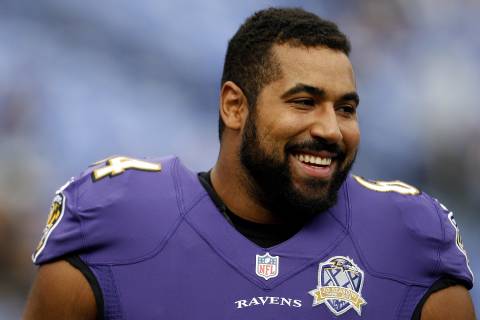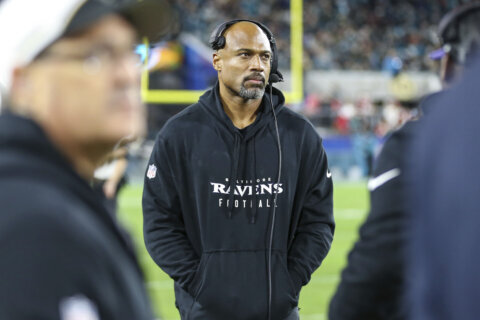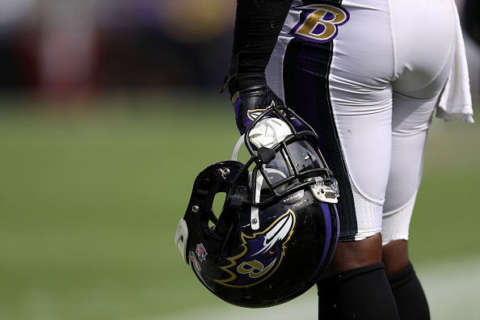John Urschel would really rather not be doing this interview. It’s not personal; it’s not me (I’m fairly certain). It’s just that a media tour cuts against everything he is — an introvert, one of the millions of us in this country with anxiety, a mathematician who is desperate to get back to work to make the next discovery, to learn more about the way our universe works.
But Urschel has to balance that impulse against the reality that he’s taken the time to write a book explaining all of that, and that it would be a waste of that effort not to try to get people to read it. That book, “Mind and Matter: A Life in Math and Football” explores his particular path navigating the very top of two very different professions.
There’s an honesty and a clarity in the way he speaks that not many people share. But that hardly means he’s an open book of answers without the right questions to prompt them. The last time we spoke, two-and-a-half years ago, it had been reported that he was only studying for his Ph.D. in the NFL offseason. That was later revealed not to be the case, something Urschel declined to mention in that interview.
“Well, did you ask me if I was doing both at the same time?” he asked this time. (I checked the tape — I hadn’t).
It wasn’t until later that I realized I’d missed the opportunity for the follow-up: Would you have told me if I had?
Below is a Q&A with Urschel. It has been edited for clarity and brevity.
WTOP: I know you’re in the middle of a lot of interviews, so I’ll try not to ask the same questions everyone else is
John Urschel: “Thank you, I appreciate that.”
This is essentially an autobiography. Did you have any trepidation about writing an autobiography while you’re still in your 20s?
“Yeah, that’s a great question. No, mainly because this really did not come about in the sense of, like, I thought, ‘Oh, I want to write an autobiography.’ This is not at all how this book came to be, I would say. It really started as, ‘I really want to share my experiences with mathematics, my story with math, and my love of mathematics.’ And Penguin loved the idea, but they sort of pushed me to say, ‘No, John, you have to really put more of yourself into it. You really do have to talk about football, because it was such a big and important part of your life.’ And I think they were correct and I’m glad they sort of gave me that pushback, because I’m really happy with the finished product. In many ways, I’d say it’s not really an autobiography, it’s really sort of a … love story to the two passions of mine. And I think, yes, I am young, but there was a very natural breaking point in my life which makes it very reasonable. This is a very self-contained story.”
You jump back and forth between the two topics. You talk a lot in the book about compartmentalizing to be able to do both. Do you think that’s something that exists in high achievers in all fields?
“That’s a great question. I’m not certain, but I think so. All the people that I’ve met who are capable of doing multiple things at a high level are really good at compartmentalizing. Because you have to. Because your ability or inability to do one task at a certain time shouldn’t cripple you and make you unable to do anything else. I think it’s really important to be able to go back and forth and not have one thing influence the other. This is very crucial.
Is there someone who you can point to, in either football or math, who is a good example of someone who can wholly encapsulate everything and focus on that?
“Encapsulating multiple things and focusing on multiple things? I’m having a hard time thinking of someone. But, for instance, when I played for the Ravens, Marshall Yanda, one of the things he was always big on was this concept of just, ‘Do your job.’ Don’t pay attention to what’s going on in the game. Don’t worry about any of this. Don’t get emotional about things you can’t control. Just do your job.”
Whose decision was it to write it in the back and forth way? Was that something you figured out with Louisa (Thomas, his partner and co-writer)?
“At first it was, let me tell you (laughing), at first, it was very, very math-heavy. I was sprinkling the football in. And (publisher) Penguin said, ‘No, no, no, we want you to truly flesh out all the things you’re experiencing, all the things you’re going through.’ And then it became obvious to me and Louisa, we need to really split this, really make it like two books in one, in some sense. I think that was the right decision, and I’m very, very grateful to Penguin for sort of pushing me to really make this book as great as I possibly can. Because the math that I wanted to convey, and my experiences with mathematics, it’s all there. But also, there is my experiences with football. And my experiences trying to juggle both, trying to be great at both at the same time. I think I’m just really pleased with how it all turned out.”
Your passion for the math is obvious as a reader. Was it a struggle to bring same energy to the football side of it?
“No, no, not at all. I have to say, looking back on a lot of my football experiences, I just have amazing memories, especially from playing college football at Penn State. So it was really enjoyable to look back and think about these things.”
How long were you both playing in the NFL and studying in the Ph.D. program and at the same time, and was there a defining moment when you realized it was too much?
“Oh, yeah, I would say after my third year in the league? That season? That one was a little much. Like, I really thought, this was really starting to become a little much. These are two full-time jobs, and do I really want to do this again?
Was there ever a worry when you left football that you would use the platform the NFL afforded you to connect with and inspire people?
“Well, first of all, I have this platform. I don’t particularly like it, really, if we’re being really, really honest. I think there’s more deserving people to sort of champion math and champion the benefits of it. But for some reason, people like football. I’m in the spotlight. This is my responsibility, and I take that very, very seriously. And I have a responsibility to do the things I do. I really have to say, I’m not a big fan of attention. I’m not really a big fan of people all up in my business. I’m a simple guy. I like simple things. I like leading a simple life. And this book was really, and in many ways is really, me saying goodbye to this chapter in my life. I hope young people can take something from this. I hope this can be inspirational, especially for young people. And I will continue to champion mathematics, but I will not mind one bit if that platform, at least sort of through sports, just sort of disappears. That’s fine by me.”
Is the book tour taking you away from stuff you’d rather be doing?
“Yes, I have to say, this book tour has been absolutely dreadful. I’m really not enjoying it (pause). But I am also enjoying it in the following sense. I really don’t like being the center of attention. I really like just doing my math and doing things I really enjoy. And this book is really important to me. But I have to admit, doing media is not the easiest thing in the world for me. And especially taking time away from math. You know, I really enjoy math. And when I’m doing something else that’s not math, it’s not so enjoyable. But I think it’s really important that I do do this. First of all, it is important that I talk about the book, that I promote the book, because I think this book is really good. I spent a lot of time on it. I spent a lot of time sort of crafting it, going through the mathematics and making sure it’s the perfect level for people. This book is really important to me and I think I’d be doing myself a disservice if I put in all this work on a book that really, really matters to me, but then I just said, ‘Oh, I’m going to take it easy on promoting it because I don’t really love doing media.’”
Football’s always served as this outlet away from math. Do you find yourself searching for another place away from math, or are you happy to be able to devote your attention 100 percent to your work?
“No, I don’t really need something to fill that gap, I don’t think. Happily, my focus definitely isn’t 100 percent on math. I’m very focused on raising my daughter, and this has taken up a lot of time.
Are you working on anything you’re really excited about that you’re able to talk about?
“Plenty of things I’m very excited about, nothing I can talk about.”







